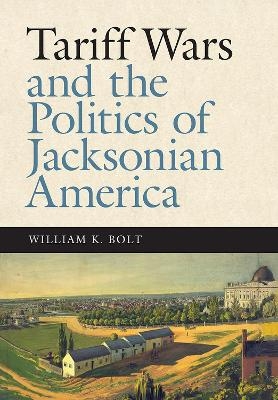
Tariff Wars and the Politics of Jacksonian America
Seiten
2017
Vanderbilt University Press (Verlag)
978-0-8265-2136-1 (ISBN)
Vanderbilt University Press (Verlag)
978-0-8265-2136-1 (ISBN)
Before the Civil War, the American people did not have to worry about a federal tax collector coming to their door. The reason why was the tariff, taxing foreign goods and imports on arrival in the United States. Tariff Wars and the Politics of Jacksonian America attempts to show why the tariff was an important part of the national narrative in the antebellum period. The debates in Congress over the tariff were acrimonious, with pitched arguments between politicians, interest groups, newspapers, and a broader electorate.
The spreading of democracy caused by the tariff evoked bitter sectional controversy among Americans. Northerners claimed they needed a tariff to protect their industries and also their wages. Southerners alleged the tariff forced them to buy goods at increased prices. Having lost the argument against the tariff on its merits, in the 1820s, southerners began to argue the Constitution did not allow Congress to enact a protective tariff. In this fight, we see increased tensions between northerners and southerners in the decades before the Civil War began.
As Tariff Wars reveals, this struggle spawned a controversy that placed the nation on a path that would lead to the early morning hours of Charleston Harbor in April of 1861.
The spreading of democracy caused by the tariff evoked bitter sectional controversy among Americans. Northerners claimed they needed a tariff to protect their industries and also their wages. Southerners alleged the tariff forced them to buy goods at increased prices. Having lost the argument against the tariff on its merits, in the 1820s, southerners began to argue the Constitution did not allow Congress to enact a protective tariff. In this fight, we see increased tensions between northerners and southerners in the decades before the Civil War began.
As Tariff Wars reveals, this struggle spawned a controversy that placed the nation on a path that would lead to the early morning hours of Charleston Harbor in April of 1861.
William K. Bolt is Assistant Professor of History at Francis Marion University, USA and former assistant editor on the James K. Polk Project.
| Erscheinungsdatum | 01.03.2017 |
|---|---|
| Verlagsort | Tennessee |
| Sprache | englisch |
| Maße | 175 x 256 mm |
| Gewicht | 840 g |
| Themenwelt | Geschichte ► Allgemeine Geschichte ► Neuzeit (bis 1918) |
| Geisteswissenschaften ► Geschichte ► Regional- / Ländergeschichte | |
| Recht / Steuern ► Steuern / Steuerrecht | |
| Sozialwissenschaften ► Politik / Verwaltung ► Staat / Verwaltung | |
| Wirtschaft ► Volkswirtschaftslehre ► Makroökonomie | |
| ISBN-10 | 0-8265-2136-3 / 0826521363 |
| ISBN-13 | 978-0-8265-2136-1 / 9780826521361 |
| Zustand | Neuware |
| Haben Sie eine Frage zum Produkt? |
Mehr entdecken
aus dem Bereich
aus dem Bereich
Europa 1848/49 und der Kampf für eine neue Welt
Buch | Hardcover (2023)
DVA (Verlag)
CHF 67,20
Giordano Bruno - ein ketzerisches Leben
Buch | Hardcover (2024)
C.H.Beck (Verlag)
CHF 41,85


